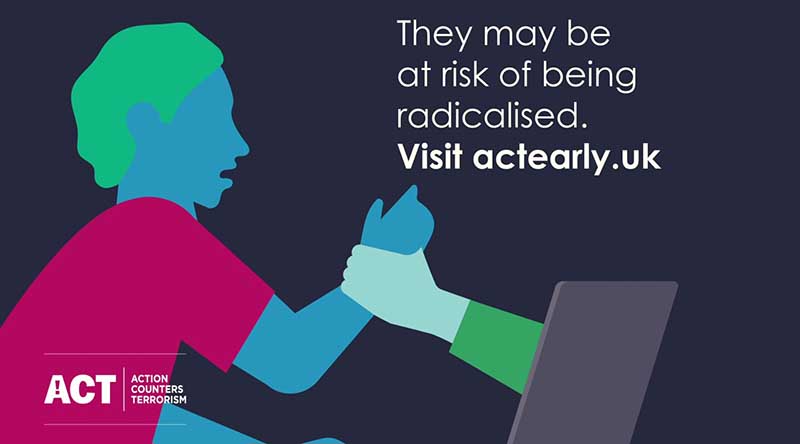
Paul Thomas
Professor of Youth and Policy, HUDCRES
"Helping friends and family identify loved ones who are getting involved in the planning of terrorism and terror activity has been a real blind spot in national counter-terrorism policy. Our research has helped address this."
A major new national initiative aimed at helping spot early signs of radicalisation or possible involvement in terrorism is directly acting upon years of research by University of Huddersfield academics.
Counter Terrorism Policing (CTP), the national policing organisation which protects the UK from terrorism, has launched a new safeguarding website and social media campaign, called Act Early, designed to help people share their concerns about relatives or friends who they are worried are becoming radicalised by ideologies.
The CTP’s digital Prevent campaign has drawn on the research of Professor Paul Thomas, Professor of Youth and Policy in the School of Education and Professional Development. He has researched a wide range of community issues, including the Prevent counter-terrorism strategy, and collaborated with the University of Huddersfield's Visiting Professor Michele Grossman of Deakin University, Australia on the Community Reporting Thresholds project for the UK’s Centre for Research and Evidence on Security Threats (CREST).
That research resulted in a report for CREST which made a series of recommendations that have influenced policymakers and counter-terrorism specialists. Evidence from the inquest into the 2017 London Bridge attack showed that few family or friends share their concerns either at all or until almost too late, so CTP’s new campaign, drawing on Professor Thomas’ findings, now offers various mechanisms for people to make contact at an early stage.

Resources in the new campaign include videos, case studies and advice, plus a dedicated phone line for sharing concerns in confidence with Prevent officers.
Spotting the early signs of radicalisation are vital
“Helping friends and family identify loved ones who are getting involved in the planning of terrorism and terror activity has been a real blind spot in national counter-terrorism policy. Our research has helped address this,” says Professor Thomas.
There has been a UK Anti-Terrorism hotline in place for several decades, but this new campaign and its resources are not a replacement service for that ‘emergency’ line.
“We call it ‘intimates reporting’ - it is about family or close friends having early concerns and sharing them,” explains Professor Thomas. “Our research looked at whether people would share these concerns about an ‘intimate’ with the authorities. If they wouldn’t immediately, what would they do first? What are the barriers to them sharing their worries?
“Before formally reporting to the police, the research pointed towards an initial willingness to address possible radicalisation and worries over changes on behaviour or lifestyle directly with the relative or friend concerned. If that was brushed off, then trusted family members would be approached.
“In the wider community, influential leaders such as former teachers or sports coaches were found to be the kind of figures with whom concerns would be shared, and not just religious figures such as vicars or imams. Alongside this, community members would attempt to seek further information or guidance that could help them understand the changes they were noticing in their loved one and what to do about it – this new campaign and its resources addresses that identified need.

“The new CTP campaign from is a strong example of working with policy makers, taking research findings about a policy problem and putting them into practice,” Professor Thomas adds. “It was identified as a blind spot, and we have worked with CREST and the police to design a strong piece of research that has given some insights that helped some policy responses to that problem.
Working with communities
“Previously, community reporting of concerns has been a less developed part of terrorism prevention. There has been a stronger focus around prevention in schools, for example, and teachers have been legally obliged to implement the Prevent strategy since 2015.
“The community-based concern with friends and families has been an under-developed part of possibly preventing radicalisation, but our research is helping police and authorities address that in a way that will help the communities themselves to protect their loved ones.”
Kath Jack, whose son was convicted for membership of right wing terrorism group National Action, has encouraged people to use Act Early to prevent their loved ones from being radicalised online.
“My son’s story could have been so different if I had had advice and support like this available to me.
“I did know something was going wrong in his life but didn’t know enough about what it was, how to talk to him about it without arguments or where to go for help.
“I would encourage any other mums, dads or wider friends and families to Act Early and seek help and support. The police and other services can help turn lives around if you tell them what’s going on early enough.”
For help and advice, visit www.actearly.uk, or call the national Police Prevent Advice Line on 0800 011 3764, in confidence, and our specially trained Prevent officers will listen carefully to your concerns.
Multiculturalism in northern England is no failure
The book 'Race, space and multiculturalism in northern England' challenges assumptions and flags up the many successes of multiculturalism.
Barriers in reporting suspected extremism
Paul Thomas leads an initiative into barriers present when people are faced with reporting someone they suspect of violent extremism
Schools making 'Prevent duty' work
Research by Paul Thomas into Prevent flags up concerns about some of its fundemental aspects.
